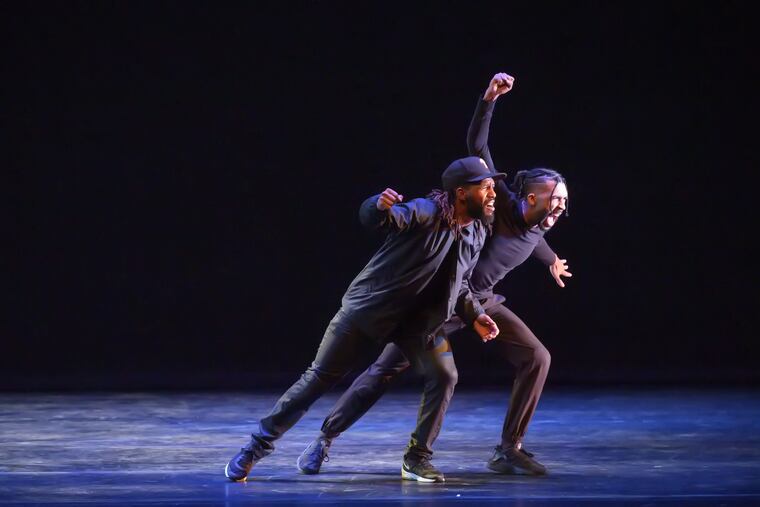Philly’s Rennie Harris revives a vintage work that tragically retains its urgency
Rennie Harris choreographed "A Day in the Life in 1995" and has now reworked the piece for the Annenberg Center’s digital platform.

Philly’s pioneering choreographer Rennie Harris created A Day in the Life in 1995 and has now reworked the piece for the Annenberg Center’s digital platform, where it streamed live Thursday night from the Harold Prince Theatre stage, performed by five dancers from Harris’s hip-hop company, Puremovement.
A Day in the Life is the story of two brothers going about their business (danced here by Phillip Cuttino Jr. and Kai Rapelyea). They clash with police, and one of the brothers is killed.
Set to music by Dhafer Youssef, it is devastating to watch now, more than 25 years after its creation, knowing nothing has changed. We can see what is coming, and the moment is still shocking.
The Annenberg program followed with Black Promises, set to music by Beyoncé, a solo about systemic police brutality against Black men that Rapelyea both choreographed and performed.
He is an extraordinary dancer, and when he twists his arms together behind his back in bondage, the audience can almost feel the pain of his flexible shoulder joints stretching in resistance.
The Big What If, a bracingly personal solo choreographed and performed by Cuttino, preceded this paired set of works about systemic injustice.
In the piece, set to music by Jill Scott, he relives the day when he was shot as a bystander, reflecting on his own mortality with fluid arm movements and breathtaking moves, including a plunge from a kneeling position into a plank and head-first leaps into forward rolls. In a post-show Q&A, Cuttino said he cried the first few times he danced it.
Prior to that tour de force progression, the program opened with two works of more traditional, trick-filled, crowd-pleasing hip-hop dance. With Continuum, set to music by DJ Lee, and The Word, set to Osunlade, Harris was breaking the ice to deliver the message he wants us to hear.
“Rappers tell stories all the time,” he said in one clip between dances. “And so why can’t the hip-hop dancer or choreographer tell a story and use a narrative to present a particular state of mind?” His narrative voice is as compelling here as it is in his storied contemporary dance career with Philadanco and Alvin Ailey American Dance Theater.
Productionwise, the 40-minute Annenberg digital program was mostly smooth, although some of the camera angles were too far above or below the dancers, both of which were distracting. The virtual Q&A was filled with the sort of technical difficulty we’ve all experienced through a year with all manner of virtual technology.
Tickets are no longer available. Buyers who purchased tickets by 7:30 p.m. Thursday from the Annenberg Center for the Performing Arts can watch the performance on demand through Saturday.